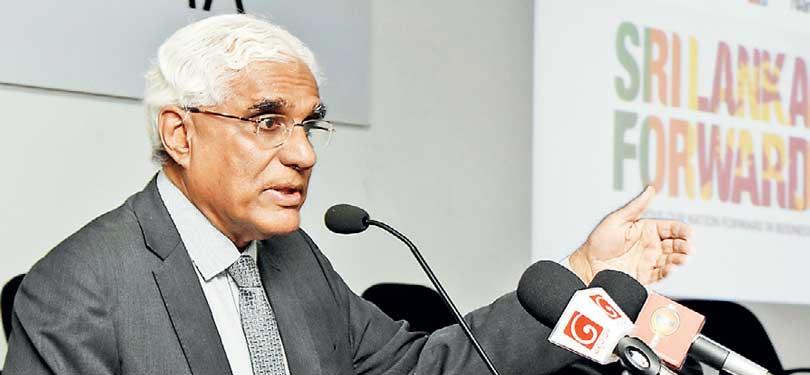30 May 2019 - {{hitsCtrl.values.hits}}

Dr. Indrajith Coomaraswamy
Pic by Nimalsiri Edirisinghe
By Nishel Fernando
Sri Lanka’s foreign reverses could tumble to US$6.3 billion at the end of this year, almost US$2 billion down from the earlier projected US$8.2 billion in the aftermath of Easter Sunday bombings, which has adversely impacted the country’s tourism industry while denting the investor sentiment.
By end-May, Sri Lanka’s foreign reverses have declined to US$6.5 billion from US$7.6 billion in April, following the repayment of an international sovereign bond (ISB) and a syndicated loan.
However, Central Bank Governor Dr. Indrajit Coomaraswamy affirmed that the country’s foreign reserves would be sufficient to service the debt with the country already having fulfilled 65 percent of its external debt repayment commitments for the year.
“It’s not a wonderful amount of reserves, but it’s nowhere near the crisis. We will be able to meet our commitments,” he assured.
He made these remarks delivering the keynote address at a forum organised by CIMA, Acclivity Training and Leo Burnett Sri Lanka, yesterday in Colombo.
Dr. Coomaraswamy noted that the impact on external front coming from Easter carnage would be US$1.9 billion in the worst-case scenario, with tourism industry losing US$900 million in net foreign exchange earnings, US$700 million loss in FDIs and US$300 million outflows from government security market.
The Central Bank is planning to raise over US$2 billion from international capital markets and international banks before the election cycles commence by the end of this year.
Dr. Coomaraswamy revealed that the World Bank has offered Sri Lanka a policy-based guarantee, which could be utilised to borrow up to US$1 billion from an international bank.
He said the government is currently working on the details with the World Bank to secure this policy-based guarantee.
The Governor noted that the Central Bank is considering a mixture of dollar denominated International Sovereign Bonds (ISBs), Panda and Samurai bonds to raise funds before elections, as the current market conditions remain favourable for Sri Lanka.
“We will be going to markets fairly quickly. If the market conditions are right, we will go for bit more,” he said.
In addition, the Central Bank will keep its options open for possible swap arrangements with the Reserve Bank of India, People’s Bank of China and the Central Bank Of Qatar worth of US$3.1 billion
“If worse comes to worse, these swaps are available as a standby,” he said.
Meanwhile, the Central Bank has also revised the forecast for the current account deficit to 2.7-2.8 percent of GDP this year from original forecast of 2.3 percent due to the impacts stemming from the Easter Sunday bomb attacks.
Speaking of the growth forecast for the year, Dr. Coomaraswamy said that the Central Bank would revise the earlier 4.5 percent GDP growth projection as the service sectors such as retail and tourism have been adversely impacted by the attacks.
The Central Bank remains concerned over these shocks being passed over to the banking sector, which could translate into a much bigger adverse impact across the economy.
So far, the Governor emphasised that the economy has remained in good shape in terms of stability.
On the fiscal front, the Central Bank expects the government to face increased pressure from dwindling revenue and with need for additional expenditure.
Dr. Coomaraswamy noted that the government is currently reviewing the budget 2019 in order to accommodate the new priorities through a process of re-prioritisation.
“The government will try to accommodate new priorities as much as possible through expenditure switching and by minimising the incremental expenditure.
If there’s incremental expenditure, we will either have to raise taxes or we will have to borrow more. Neither are very good options,” he said.
25 Nov 2024 1 hours ago
25 Nov 2024 1 hours ago
25 Nov 2024 2 hours ago
25 Nov 2024 2 hours ago
25 Nov 2024 3 hours ago